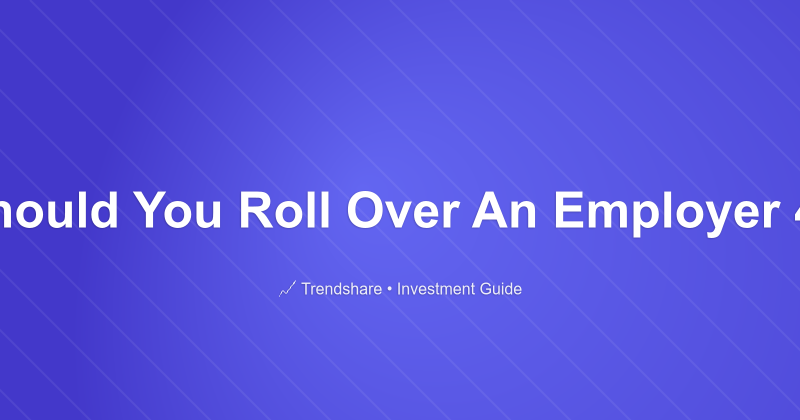
Why Should You Roll Over An Employer 401(k)?
By Ethan Mercer
Financial Technology Analyst • 10+ years in fintech and payments
Switched jobs? Should you keep your previous employer's 401(k) or roll it over? Roll it over -- here's why!
If you've worked a professional job in the private sector for a while, you probably have a 401(k). That's a good way to save up money for retirement, with its tax deferred contributions and, if you're fortunate, employer matching contributions.
You're probably not going to stick with the same employer for your entire career, however. (You're probably not with the same employer you started with either.) If you've switched jobs two or three times over a twenty year career so far, you may have multiple 401(k) accounts with multiple financial service providers. This doesn't have to be the case.
Regardless of any change of job, location, tax status, anything, all the money you've contributed and all the money your employer has contributed on your behalf belongs to you. You may have the right and the opportunity to roll over your 401(k) from previous employers to another plan, including your own self-directed IRA.
The details of this rollover will vary, depending on the destination account, your employment situation, and other factors, but this is a big decision that can go very well for you, if you meet the right criteria. Why would you roll over a 401(k) into an IRA?
More Fund Choices
Available investment choices for employer-sponsored 401(k) programs have improved in the past decade, but you still probably have fewer than a couple of dozen individual funds from which to choose. You may have a target-date fund, a couple of indexed investments, a bond fund, some international possibilities, and a few well-known mixtures.
You don't have access to the entirety of the stock market, or even the entirety of the ETF universe. That's just the nature of employer-sponsored programs. To make them easier to administer, you have a few options.
Some of these options can be good. You can often find a decent index fund and a medium or small-cap fund—but you'll miss out on undervalued stocks, where the opportunities can be much greater.
Cheaper Fund Choices
In a self-directed IRA with a discount broker, you'll have access to any ETF you can imagine, which lets you pick and choose based on fund costs as well as philosophy and performance. Why pay 0.65% fees for a fund that's an equivalent of a fund with 0.15% fees?
This isn't the biggest advantage, but over decades it can add up.
This point is only strengthened by the fact that some 401(k) providers charge additional fees every quarter.
Consolidation
If you practice portfolio rebalancing, it's easier to do this with one account than several. (If you don't rebalance your portfolio across multiple accounts, having only one account makes it easier to start.
Furthermore, your broker may give you access to additional tools, more trades, lower commissions, and other perks as you have more and more money in your account. $50,000 apiece in five accounts might not buy you much time and attention, but $250,000 in a single account can get you started with additional investment abilities at a brokerage.
Disadvantages of 401(k) Rollover
If you do consider rolling over a 401(k) into your own IRA, do so with caution and intent. If you've never taken out a loan, received employer stock with special distribution instructions, or done anything other than contribute, the process can be easy. Anything special makes the process more difficult, and may incur tax penalties.
A rollover may not always be in your best interest, so this advice works best for self-directed investors who already know how to invest. You may have to spend some time on the phone with your account administrator, working through financial details, only to receive a check in the mail in a couple of weeks that you have to forward elsewhere.
As the linked article argues, paying a separate financial advisor to tell you where to invest your money can rack up additional and unnecessary fees, and end up with you owning funds that will underperform the options you had with your previous employer's plan. Rolling over your 401(k) works far better when you're a confident, self-directed investor.
None of these are reasons never to perform the rollover, but the process isn't always as simple as paying a bill online.
Should You Roll Over Your 401(k)?
For most investors reading this who've already set up their own brokerage accounts, made a few trades, picked some great undervalued stocks, the advantages outweigh the potential negatives. Again, any complicated tax or distribution scenarios can change the situation, so consult with the appropriate professionals to avoid unnecessary and unwanted surprises.
For the novice investor making his or her first steps into gaining more financial control, the advice to invest in simple index funds is still wise. If you can avoid any unwarranted penalties and get access to better/cheaper fund choices and pay less in fees, the advantage may be worth the extra overhead you need to get settled with your own IRA and transfer everything over.
Even if you're a buy-and-forget it investor, who rebalances once a year (if that), the amount of control you have over a single account, with funds or stocks of your choosing, can help you sleep better at night. You know you've invested in exactly what you wanted and are paying exactly what it's worth. That's worth a lot.
Investment Disclaimer
This article is for educational purposes only and does not constitute investment advice. Stock prices, financial metrics, and market conditions change constantly. Company examples are provided for illustration and should not be considered recommendations. Always verify current data from official sources such as company investor relations pages or SEC filings, assess your own risk tolerance and investment objectives, and consult a qualified financial advisor before making investment decisions. Past performance does not guarantee future results.